|
|
|
Sort Order |
|
|
|
Items / Page
|
|
|
|
|
|
|
| Srl | Item |
| 1 |
ID:
106925
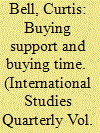

|
|
|
|
|
| Publication |
2011.
|
| Summary/Abstract |
History provides many examples of benevolent dictators who become increasingly repressive and new democracies that take years to improve public welfare. I account for this temporal variation in public goods provision by considering how regime consolidation changes leaders' incentives to provide public goods. To stay in office, all leaders must maintain a sufficient level of support from those possessing the power to replace the leader via institutional processes. Leaders of unconsolidated regimes face additional threats posed by viable extra-institutional challengers, such as coup plotters and revolutionaries. Tests on public goods spanning political freedoms, government expenditures, education, and health generally suggest leaders' incentives for public goods provision change as regime consolidation insulates leaders from these extra-institutional threats to power. Regimes with inclusive institutions spend more on public goods as they consolidate and become less vulnerable to elite demands. Exclusive regimes spend more on public goods when they are vulnerable to the excluded masses, but become increasingly repressive as they become insulated from popular uprisings. Consequently, consolidation magnifies the positive effect of democracy on public goods provision. These findings have important implications for the literatures on public goods provision and regime survival.
|
|
|
|
|
|
|
|
|
|
|
|
|
|
|
|
| 2 |
ID:
154740
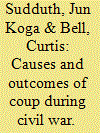

|
|
|
|
|
| Summary/Abstract |
Though approximately one in four coup attempts takes place during an ongoing civil war, scholars have not yet analyzed how the incidence of civil war affects coup attempts and outcomes. We conduct the first empirical analysis of the relationship between ongoing civil war and coup activity, finding (1) war increases the risk of a coup attempt, though (2) war-time coup attempts are significantly less likely to be successful, and (3) the risk of war-time coup is much higher when states face stronger rebel groups that pose greater threats to the political survival of the incumbent government. We attribute these findings to the pernicious effect of ongoing war on the welfare of the military elites and soldiers who have the greatest capacity to execute a coup attempt. As war diminishes their welfare and creates uncertainty about the future of the state, potential plotters become more willing to accept riskier coup attempts than they might plot during peace-time. Coup motivations are greatest when incumbents are more likely to lose their wars, and this causes coup plotters to attempt more and riskier coups when rebels are relatively strong.
|
|
|
|
|
|
|
|
|
|
|
|
|
|
|
|
| 3 |
ID:
158844
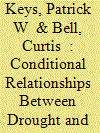

|
|
|
|
|
| Summary/Abstract |
Much of the literature on climate change adaptation claims the destabilizing consequences of environmental crises are mitigated by sociopolitical conditions that influence a state's susceptibility to scarcity-induced violence. However, few cross-national studies provide evidence of conditional scarcity-conflict relationships. This analysis of drought severity and civil conflict onset in sub-Saharan Africa (1962–2006) uncovers three sociopolitical conditions that influence the link between environmental scarcity and civil conflict: social vulnerability, state capacity, and unequal distribution of resources. Surprisingly, we find drought does not exacerbate the high risk of conflict in the vulnerable, incapable, and unequal states thought to be especially susceptible to increased scarcity. Instead, drought negates the peace-favoring attributes of stable states with less vulnerable populations. During severe drought, states with sociopolitical conditions that would otherwise favor peace are no less likely to suffer conflict than states with sociopolitical conditions that would otherwise increase the risk of violence. These findings, which are robust across several measures of these sociopolitical concepts, suggest environmental scarcity is most likely to increase the risk of conflict where populations have more to lose relative to periods with more favorable weather.
|
|
|
|
|
|
|
|
|
|
|
|
|
|
|
|
| 4 |
ID:
141850
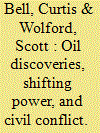

|
|
|
|
|
| Summary/Abstract |
Can the discovery of petroleum resources increase the risk of civil conflict even before their exploitation? We argue that it can, but only in poorer states where oil revenues threaten to alter the balance of power between regimes and their opponents, rendering bargains in the present obsolete in the future. We develop our claims via a game-theoretic model of bargaining between a government and a rebel group, where decisions over war and peace occur in the shadow of increasing oil wealth that both increases national wealth and shifts relative power in the government's favor. To test the model's main hypothesis, we leverage data on newly discovered oil deposits as an indicator of the state's expected future power resources. Our argument has important implications for the literature on credible commitments, power shifts, and violent conflict.
|
|
|
|
|
|
|
|
|
|
|
|
|
|
|
|
| 5 |
ID:
158692
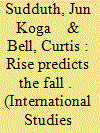

|
|
|
|
|
| Summary/Abstract |
How does the way a nondemocratic leader takes power affect the stability of their government? Prior research argues that irregular leader entries—those that violate the regime's norms for leader selection—are especially likely to foreshadow subsequent unconstitutional transitions. This article contends that some forms of irregular leader entry can actually protect leaders from subsequently being forcibly removed from office. When leaders use a strong and loyal coalition of supporters to overthrow not only their predecessors, but their entire ruling regimes, they demonstrate their strength to any potential rivals. Thus, leaders that gain power through, for example, successful rebellions, popular uprisings, and major regime-changing coups, deter subsequent challenges. They are substantially less likely to be ousted than leaders who take power in ways—such as via normal succession or reshuffling among ruling elites—that do not convey strength so convincingly. We assess our claims by analyzing an original dataset of nondemocratic leader transitions. We show that accounting for the strength demonstrated during a leader's entry to power substantially improves our ability to predict how, and when, that leader will eventually leave office.
|
|
|
|
|
|
|
|
|
|
|
|
|
|
|
|
|
|
|
|
|